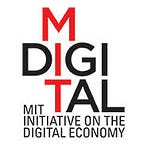Video: Emerging Technology and the U.S. Economy
Experts explore AI’s wide-ranging economic and social implications at a recent Stanford forum
The wide-ranging and often-rocky relationship between Emerging Technology and the U.S. Economy was the topic of conversation Monday, May 6, at a public discussion hosted by the Hoover Institution at Stanford University.
MIT IDE Director, Erik Brynjolfsson, talked about his recent research on AI and machine learning showing that many jobs won’t be replaced by machines. Digital technologies, in fact, will also create new opportunities for meaningful work, he told attendees.
Moderated by Gopi Shah Goda, of the Stanford Institute for Economic Policy Research, panelists discussed the convergence of changing demographics and advancing technology and the impact on the U.S. economy. For example, how can we improve the educational system for new jobs, remove bias in AI, and ensure a growing, productive population?
Dipayan Ghosh, Harvard University, said that society has to take a hard look at the implications of new technologies such as the unintentional spread of disinformation. He suggested that new governance standards are needed to stave off algorithm bias and unchecked consumer data collection.
Watch video of the event here.
Panelists, pictured below from left, were: Moderator, Gopi Shah Goda; Erik Brynjolfsson; Dipayan Ghosh; Van Ton-Quinlivan, California Community Colleges; Jim Hollifield, Southern Methodist University, and John Taylor, of the Hoover Institution.
